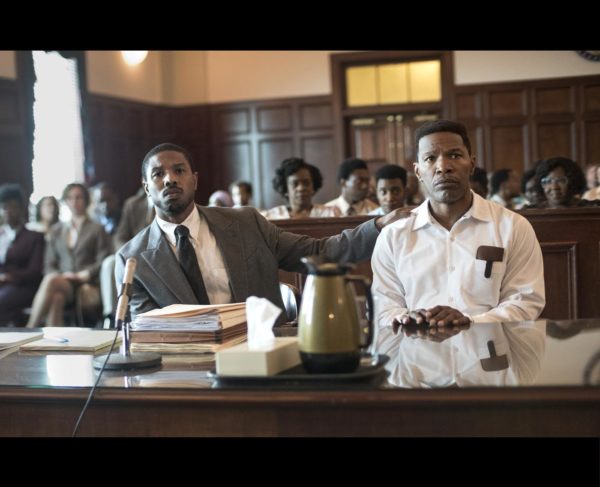Film Review: “Just Mercy” — The Tragedy of Justice Deferred
By Peg Aloi
Artful films like Just Mercy remain necessary — these are the kind of stories our troubled nation needs to hear if we are to move forward.
Just Mercy, directed by Destin Daniel Cretton. Screening at Kendall Square Cinema, Capitol Theatre, AMC Boston Common, and elsewhere throughout New England.

Michael B. Jordan and Jamie Foxx in a scene from “Just Mercy.”
Destin Daniel Cretton’s story of Death Row prisoners in Alabama is not flawless, but it is decidedly worthwhile, mainly because of the powerful efforts of its stellar cast. As played by Michael B. Jordan (Fruitvale Station, Black Panther), Bryan Stevenson (whose true story was adapted for the screen by Cretton and Andrew Lanham) is noble but grounded, a Harvard law graduate who heads to Alabama to assist an activist (Brie Larson in an understated performance) who is running a non-profit organization that helps prisoners on Death Row receive adequate legal representation. In Monroeville, Alabama, “adequate” turns out to be a relative term: the system is corrupt, biased against justice or even basic fairness when it comes to treatment of African-Americans accused of violent crimes. The Monroe County sheriff (Michael Harding) is elected again and again despite the racist decisions he makes from his bench. The local district attorney is not much better.
Stevenson’s main client is Walter McMillian (played with stunning intensity by Jamie Foxx), an African-American man accused of murdering a white woman during a botched robbery. There is little evidence to support his conviction, apart from a problematic bit of eye witness testimony from another beleaguered prisoner, played by the excellent Tim Blake Nelson (The Ballad of Buster Scruggs). Before being accused of the crime that landed him on Death Row, McMillian was already on police radar for minor offenses. But also because he had an extramarital affair with a white woman. This transgression (in the eyes of the prejudiced white community) is particularly significant given that Monroeville is also the home of Harper Lee, author of To Kill A Mockingbird; a detail that Stevenson has pointed out to him more than once by city officials. At the heart of this novel is a false accusation of rape by a white woman against a black man. The irony is harsh: clearly the demons of the Jim Crow south are slow to dissipate, and are conjured anew in the post Civil Rights era.
Soon after he arrives in town, the even-tempered Stevenson is harassed by local law enforcement, who rough him up and even pull a gun on him during a traffic stop. The restrained, indignant anger in Stevenson’s posture cannot conceal the gleam of terror in his eyes. Jordan’s calibrated performance vividly captures the extreme emotions of this moment and others where he acknowledges the racism that permeates this town. This scene typifies the daily challenge for young black men who are put in harm’s way when they cross paths with racist, narcissistic cops. Despite a myriad stumbling blocks, including a local African-American community that has been disappointed too many times by too many attorneys, Stevenson slowly but solidly makes progress in his battle for justice for McMillian. The system, alas, is stubbornly entrenched; no judge is willing to admit that they made a mistake the first time around.
Stevenson also works for a stay of execution for Herbert Richardson (Rob Morgan), a prisoner who contributed to the accidental death of a young woman while in a manic episode caused by PTSD. Richardson admits his crime and is remorseful. His cellmates are kind and supportive, their understanding underscoring another irony: that he should have received better treatment for his mental problems and trauma before the tragic incident. Richardson realizes that he doesn’t below in prison; Morgan’s performance is exquisite and heart wrenching. The camaraderie of the Death Row inmates is devastating, and these scenes linger just long enough to haunt and enrage.
Just Mercy is but one of a number of 2019 narratives that dramatize African Americans’ monumental struggle for justice, among them the excellent Netflix miniseries helmed by Ava Duvernay, When They See Us, and Chinonye Chukwu’s Clemency, which opens in wide release next weekend (look for reviews coming from me of both). Yes, representation and diversity in Hollywood has made modest strides in recent years, but there is no question artful films like Just Mercy remain necessary — these are the kind of stories our troubled nation needs to hear if we are to move forward.
Peg Aloi is a former film critic for The Boston Phoenix and member of the Boston Society of Film Critics. She taught film studies in Boston for over a decade. She writes on film, TV, and culture for web publications like Vice, Polygon, Bustle, Mic, The Orlando Weekly, Crooked Marquee, and Bloody Disgusting. Her blog “The Witching Hour” can be found at themediawitch.com.
